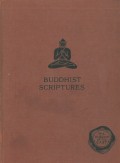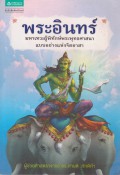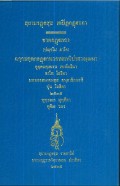Málavika and Agni·mitra
While the other works of Kali·dasa are populated by supernatural beings and larger-than-life people, “Málavika and Agni·mitra” derives its plot from history and features thoroughly mortal ch…
- ครั้งที่จัดทำ
- -
- ISBN/ISSN
- 9780814787021
- ลักษณะวัสดุ
- 346 pp.
- ชื่อชุด
- Clay Sanskrit library, 56.
- เลขหมู่
- -
Maha·bhárata X-XI: Dead of Night & The Women.
Three exhausted warriors return to their camp, stunned to find it overrun by their enemies. Their fellow soldiers all lie dead. The sound of their enemies, the five sons of Pandu and their allies t…
- ครั้งที่จัดทำ
- -
- ISBN/ISSN
- 9780814717271
- ลักษณะวัสดุ
- 416 pp.
- ชื่อชุด
- Clay Sanskrit library, 54.
- เลขหมู่
- -
Maha·bhárata VII: Drona (volume two of four).
Volume Two of ‘Drona’ begins in the aftermath of tragedy. As evening falls, Árjuna journeys wearily back to camp and is greeted by the ashen faces of his brothers. Before they speak, he guesse…
- ครั้งที่จัดทำ
- -
- ISBN/ISSN
- 9780814767764
- ลักษณะวัสดุ
- 394 pp.
- ชื่อชุด
- Clay Sanskrit library, 53.
- เลขหมู่
- -
The Rise of Wisdom Moon
“The Rise of Wisdom Moon” (Prabodhacandrodaya) was composed during the mid-eleventh century by Krishna·mishra, an otherwise unknown poet in the service of the Chandella dynasty, whose cultural…
- ครั้งที่จัดทำ
- -
- ISBN/ISSN
- 9780814748381
- ลักษณะวัสดุ
- 396 pp.
- ชื่อชุด
- Clay Sanskrit library, 52.
- เลขหมู่
- -
Princess Kadámbari (volume one of three) Cantos 1-2
No Sanskrit poet is more interesting, original, or greater than Bana. His prose poem “Princess Kadámbari” is his supreme achievement. His patron, King Harsha, ruled much of northern India from…
- ครั้งที่จัดทำ
- -
- ISBN/ISSN
- 9780814740804
- ลักษณะวัสดุ
- 558 pp.
- ชื่อชุด
- Clay Sanskrit library, 51.
- เลขหมู่
- -
Garland of the Buddha’s Past Lives (volume two of two) Cantos 21-34
In this second volume of the “Garland of the Buddha’s Past Lives,” Arya·shura applies his elegant literary skill toward composing fourteen further stories that depict the Buddha’s quest fo…
- ครั้งที่จัดทำ
- -
- ISBN/ISSN
- 9780814795835
- ลักษณะวัสดุ
- 520 pp.
- ชื่อชุด
- Clay Sanskrit library, 50.
- เลขหมู่
- -
The Quartet of Causeries
“The Quartet of Causeries” date to the Gupta era, the time of Kali·dasa, but nothing certain is known about their four authors. Though stylistically divergent, they share a common plot: the he…
- ครั้งที่จัดทำ
- -
- ISBN/ISSN
- 9780814719787
- ลักษณะวัสดุ
- 508 pp.
- ชื่อชุด
- Clay Sanskrit library, 49.
- เลขหมู่
- -
How Úrvashi Was Won
How Úrvashi was Won (Vikramorvaśīya) is one of the three surviving plays by Kali·dasa (fifth century CE), universally acknowledged as the supreme poet in classical Sanskrit; like the other two …
- ครั้งที่จัดทำ
- -
- ISBN/ISSN
- 9780814741115
- ลักษณะวัสดุ
- 300 pp.
- ชื่อชุด
- Clay Sanskrit library, 48.
- เลขหมู่
- -
Maha·bhárata VI: Bhishma (volume two of two). Cantos 65–122
This second half of ‘Bhishma’ describes the events from the beginning of the fifth day till the end of the tenth of the great battle between the Káuravas and the Pándavas. Despite grandfat…
- ครั้งที่จัดทำ
- -
- ISBN/ISSN
- 9780814717059
- ลักษณะวัสดุ
- 582 pp.
- ชื่อชุด
- Clay Sanskrit library, 47.
- เลขหมู่
- -
“Self-Surrender,” “Peace,” “Compassion,” and “The Mission of th…
This volume offers a selection from the vast literature of prayers, devotional lyrics, and introspective meditations composed in Sanskrit in South India over the last thousand years. Three poets of…
- ครั้งที่จัดทำ
- -
- ISBN/ISSN
- 9780814741108
- ลักษณะวัสดุ
- 316 pp.
- ชื่อชุด
- Clay Sanskrit library, 46.
- เลขหมู่
- -
Bhatti’s Poem: The Death of Rávana
To the dry bones of grammar Bhatti gave juicy flesh in his poem, telling the greatest Indian story in clear elegant Sanskrit. Composed in the seventh century CE, in South India, “Bhatti’s Poem:…
- ครั้งที่จัดทำ
- -
- ISBN/ISSN
- 9780814727782
- ลักษณะวัสดุ
- 566 pp.
- ชื่อชุด
- Clay Sanskrit library, 45.
- เลขหมู่
- -
The Little Clay Cart
The “Little Clay Cart” is, for Sanskrit drama, atypically romantic, funny, and thrilling, replete with love, humor, courage, and intrigues. As Wilson put it, the ten-act play is “in many resp…
- ครั้งที่จัดทำ
- -
- ISBN/ISSN
- 9780814707296
- ลักษณะวัสดุ
- 674 pp.
- ชื่อชุด
- Clay Sanskrit library, 44.
- เลขหมู่
- -
Maha·bhárata XII: Peace: “The Book of Liberation” (volume three of five…
“The Book of Liberation” is perhaps the most enigmatic philosophical text from ancient India. Although presented as the teachings of Bhishma as he lays dying on the battlefield, after the epic …
- ครั้งที่จัดทำ
- -
- ISBN/ISSN
- 9780814794531
- ลักษณะวัสดุ
- 626 pp.
- ชื่อชุด
- Clay Sanskrit library, 43.
- เลขหมู่
- -
“Bouquet of Rasa” and “River of Rasa”
By Bhānudatta Translated by Sheldon I. Pollock Purchase Download Excerpts View Rasikaranjani Manuscript View Udaipur Miniatures Bhanu is probably the most famous Sanskrit poet that no…
- ครั้งที่จัดทำ
- -
- ISBN/ISSN
- 9780814767559
- ลักษณะวัสดุ
- 442 pp.
- ชื่อชุด
- Clay Sanskrit library, 41.
- เลขหมู่
- -
Gita·govínda: Love Songs of Radha and Krishna
The “Gita·govínda” of Jaya·deva is a lyrical account of the illicit springtime love affair of Krishna and Radha, a god and goddess manifesting on earth as a cowherd and milkmaid for the sake…
- ครั้งที่จัดทำ
- -
- ISBN/ISSN
- 9780814740781
- ลักษณะวัสดุ
- 256 pp.
- ชื่อชุด
- Clay Sanskrit library, 40.
- เลขหมู่
- -
“How the Nagas Were Pleased” and “The Shattered Thighs”
Two plays that break the rules: both show the hero dying on stage, a scenario forbidden in Sanskrit dramaturgy. From widely different ideological and social backgrounds, each evokes intense emotion…
- ครั้งที่จัดทำ
- -
- ISBN/ISSN
- 9780814740668
- ลักษณะวัสดุ
- 376 pp.
- ชื่อชุด
- Clay Sanskrit library, 39.
- เลขหมู่
- -
Maha·bhárata VI: Bhishma (volume one of two) Including the “Bhagavad Gita…
‘Bhishma,’ the sixth book of the eighteen-book epic “Maha·bhárata,” narrates the first ten days of the great war between the Káuravas and the Pándavas. This first volume covers four …
- ครั้งที่จัดทำ
- -
- ISBN/ISSN
- 9780814716960
- ลักษณะวัสดุ
- 615 pp.
- ชื่อชุด
- Clay Sanskrit library, 37.
- เลขหมู่
- -
Maha·bhárata V: Preparations for War (volume two of two). Cantos 84–196
The fame of this story will exist eternally, for as long as the mountains stand and the rivers flow, Janárdana. When brahmins are gathered together, they will tell the tale of the great war of the…
- ครั้งที่จัดทำ
- -
- ISBN/ISSN
- 9780814732021
- ลักษณะวัสดุ
- 798 pp.
- ชื่อชุด
- Clay Sanskrit library, 36.
- เลขหมู่
- -
Maha·bhárata VIII: Karna (volume two of two). Cantos 55-96
The Book of “Karna” of India’s great epic the Maha·bhárata tells the events that occurred during the mighty hero Karna’s two days as general of the Káurava army. The second volume of the…
- ครั้งที่จัดทำ
- -
- ISBN/ISSN
- 9780814799956
- ลักษณะวัสดุ
- 684 pp.
- ชื่อชุด
- Clay Sanskrit library, 35.
- เลขหมู่
- -
Maha·bhárata V: Preparations for War (volume one of two). Cantos 1–83
At the beginning of “Preparations For War,” the Pándavas have just completed their thirteen year exile, most recently having lived in disguise and in humiliating service in Viráta’s city. T…
- ครั้งที่จัดทำ
- -
- ISBN/ISSN
- 9780814731918
- ลักษณะวัสดุ
- 760 pp.
- ชื่อชุด
- Clay Sanskrit library, 34.
- เลขหมู่
- -




 Computer science, information & general works
Computer science, information & general works
 Philosophy & psychology
Philosophy & psychology
 Religion
Religion
 Social sciences
Social sciences
 Language
Language
 Pure Science
Pure Science
 Applied sciences
Applied sciences
 Arts & recreation
Arts & recreation
 Literature
Literature
 History & geography
History & geography